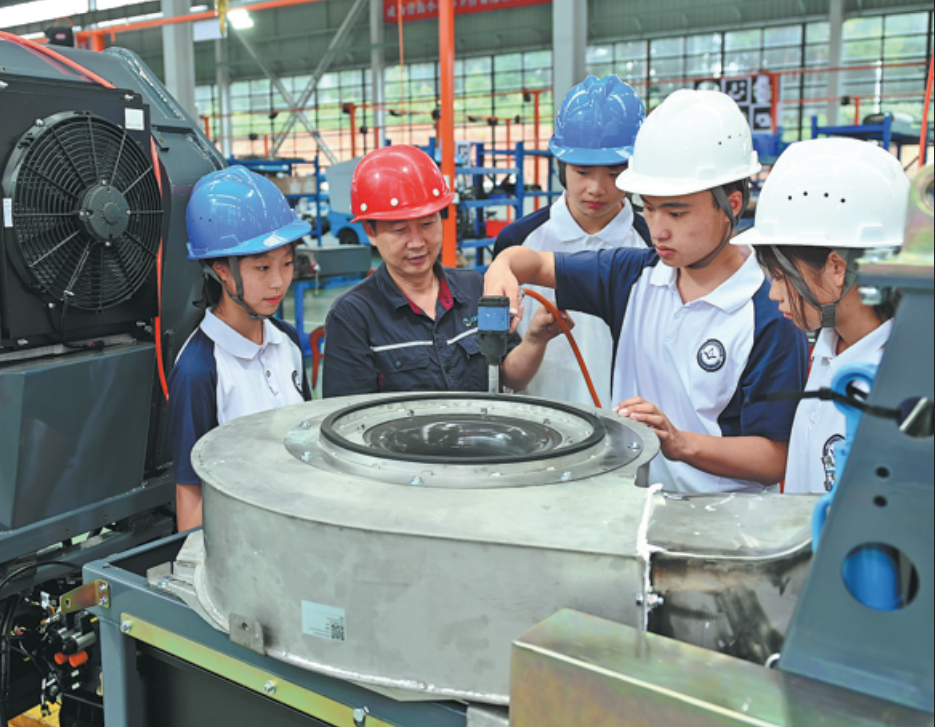Universities, companies partner to connect students with opportunities

With a record 12.22 million university graduates expected in 2025, China is expanding collaborations between institutions of higher learning and businesses to help young people find jobs and align talent supply with industry demands.
One expanding solution is the "order classes" program, whereby universities train students specifically for companies in need of talent. With these programs, universities and companies jointly design curricula and company experts help teach courses tailored to real-world applications.
At Inner Mongolia Electronic Information Vocational Technical College, a comprehensive system integrates internships, skills training and career development. The school collaborates with well-known tech companies such as Hikvision and Huawei, as well as e-commerce giant JD.com to simulate real-world scenarios in campus training centers.
"We build authentic training environments and use project-based teaching, embedding actual company projects to boost students' adaptability and problem-solving skills," said Li Haizhu, director of the college's electronic engineering teaching and research office.
ALSO READ: China's job market grows in 1st quarter
Sun Shulin, chief engineer at local telecommunications company JEDX Technology, has taught at the Inner Mongolia college for nearly a decade. His course on the internet of things, co-designed with college faculty, focuses on hands-on case studies from his engineering background.
While Sun teaches students about the application and maintenance of intelligent systems, students can use related equipment at school, gaining firsthand experience with how IoT systems work.
Through order classes such as the Hikvision Spark Plan, around 200 students are placed in internship positions at the company annually, with more than 60 percent receiving full-time employment offers afterward.
"Thanks to the program, I got the chance to intern at such a major company and stay employed. I'll keep honing my skills," said graduate Liu Xuanhe.
Liu said since joining the class, his goal was to work for Hikvision, and this motivated him in his studies. He added that the school offered targeted instruction on Hikvision's technologies and corporate culture, helping him adapt during the internship and ultimately secure a job.
So far, the college has produced 1,843 graduates through the order classes, with another 1,355 students currently enrolled. Ninety-eight percent of the graduates have secured positions at their targeted companies, realizing a seamless cycle in which enrollment connects to recruitment, internships lead to employment and graduation ensures job security.
READ MORE: China announces new financial support for youth employment
At Southwest Petroleum University in Chengdu, Sichuan province, order classes are developed with Tongwei Solar (Chengdu), a crystalline silicon solar cell manufacturer, to provide students with direct industry exposure. A highlight is a 200-kilowatt photovoltaic power station built on the library rooftop in partnership with the company, Cover News reported.
"Students gain hands-on experience with equipment and real-world data here, receiving guidance from our engineers. This immersive learning, bringing the industry site to campus, helps students understand future workplace needs early," said Wang Ping, vice-dean of the School of New Energy and Materials.
Students in the program are supported by teams of university faculty, company engineers and industry experts. Course content is jointly developed and integrates the latest industry knowledge along with core competencies such as business management and law.
Over the past five years, the university has supplied 270 graduates to Tongwei, with more than 30 percent now serving as technical leaders at the company.
Similarly, Jimei University's Navigation College in Xiamen, Fujian province, runs an order class program with shipping companies, in which students complete three years of theoretical studies and then spend their fourth year in a yearlong internship onboard ships.
Under a dual mentorship system, each student is guided by a university-appointed captain and a company-appointed captain, according to China Education Daily.
ALSO READ: China's job market resilient amidst headwinds
Chen Jiaheng, a senior majoring in navigation technology, said he is about to start work at the Guangzhou branch of COSCO Shipping Seafarer Management in Guangdong province, after completing a one-year internship aboard one of its ships.
"Having a signed agreement during university gave us clearer career goals. The knowledge and hands-on experience made us more confident about starting work," said Liu Tao, another student in the program.
Since its launch, all 779 graduates from the program have secured employment within the shipping industry. Recently, 209 freshmen locked in future job placements three years in advance through agreements with 27 companies.


